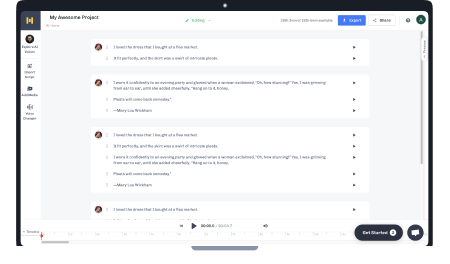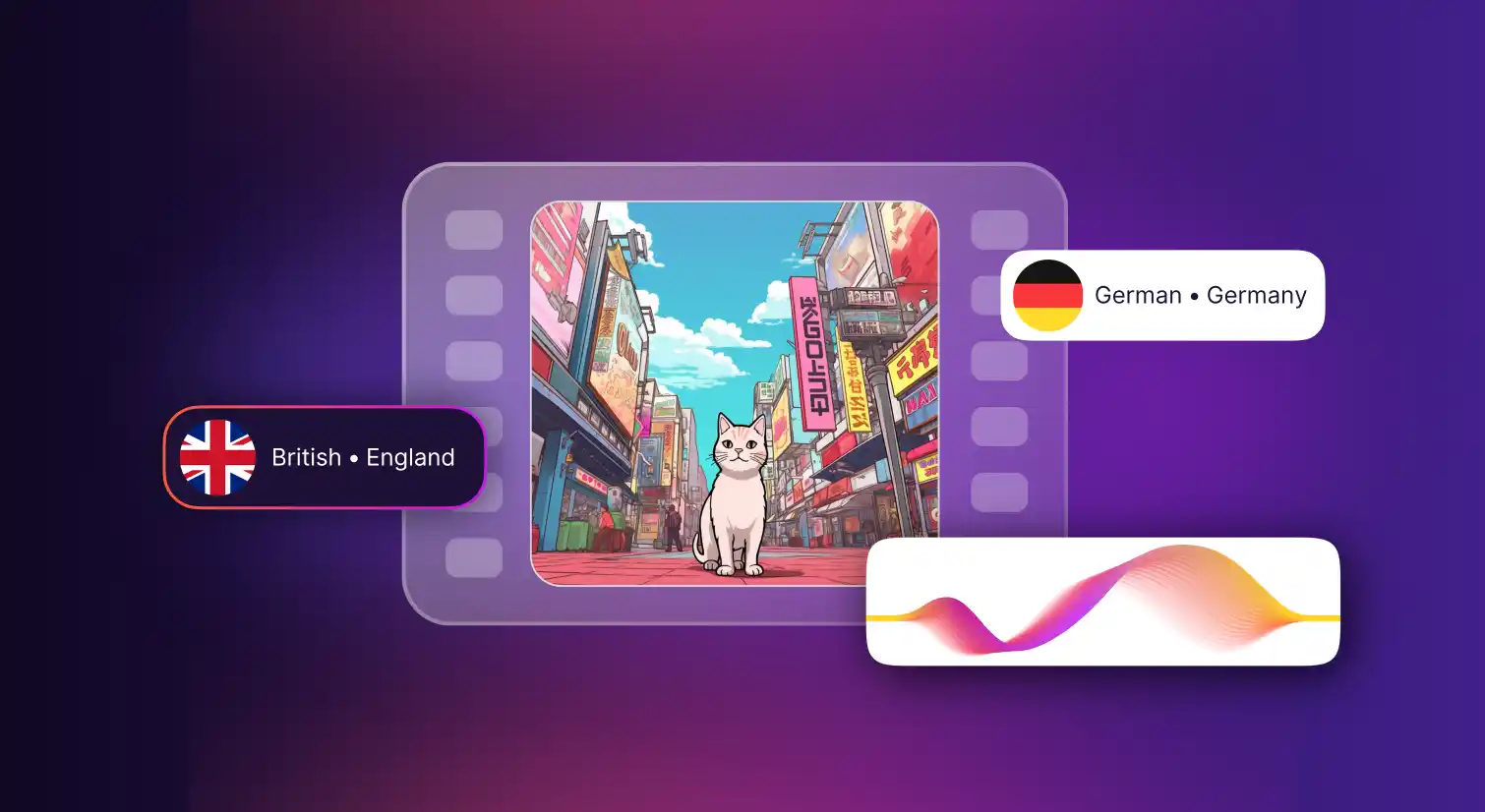Why AI Dubbing in Video Games is the Next Big Thing?

AI-driven video game dubbing has changed this scenario for the better, helping companies recreate a human’s voice at record speed and high quality. The significance of AI voice in video games can be felt across the entire gaming industry, particularly in role-playing and simulation games.
- Video Game Dubbing and Rich AI Voiceover: Virtual games today are no longer restricted to text-based dialogues and basic sound effects. Increased scope for character AI voiceovers is leading the way for immersive experiences.
- Video Game Dubbing and Inclusive Character Development: Cultural diversity in games has caught on as a trend. Gamers want accurate and more inclusive representation of characters with respect to gender, race, ethnicity, beliefs, and more. This is where global AI voiceovers can give gamers what they want: a more inclusive gaming experience.
- Video Game Dubbing and Realistic AI Voice Overs: AI Voice Generator technology has come a long way. Gaming organizations embrace AI voice to offer hyper-realistic experiences with expressive dialogue delivery. For instance, AI algorithms can ‘study’ the player’s behavior and respond promptly.
- Video Game Dubbing and Costs: Another area where AI video game dubbing shines is its ability to reduce costs. Small, independent gaming companies no longer need to compromise on character voiceovers. Instead of hiring human voiceover artists, they can leverage AI voice cloning to make the gaming experience engaging, be it on social media or any other platform.
Needless to say, AI voice generator plays an increasingly important role in the video game world. But the real question remains: How does AI video game dubbing actually work?
The Science Behind AI Dubbing in Video Game
At the outset, AI video game dubbing may seem superfluous. But multiple technologies work together to give you realistic voices and accents.
Speech Recognition
Voice generators can successfully recognize and process in-game character dialogues using automatic speech recognition (ASR) technology. Here’s how this works:
- ASR analyzes the audio input and converts it into a word sequence that the AI can understand.
- Using neural networks and sophisticated algorithms, voice AI technology accurately transcribes spoken language.
Natural Language Processing
The second-most important technology that helps generate natural-sounding dialogue and character interactions in video gaming is natural language processing (NLP).
Once the speech is translated to text using ASR, it uses NLP to learn about the real meaning of the words. NLP enables the AI voiceover to respond with context, intent, and precision.
The dialogues become more lifelike; thus, conversations between the gamer and AI voice are born.
Voice Synthesis
The third component that gives AI voice a realistic, natural, and expressive touch is voice synthesis. The synthetic voice technique leverages deep learning models (think: neural networks) to create speech from text. But what makes this technology unique is its adeptness at catching every tiny detail that makes human speech distinct (read: rhythm, accent, emotions, accents, and tone).
Now that you know about the multiple technologies that optimize AI video game dubbing, let’s explore the benefits of using AI for virtual gaming.
How Can AI Dubbing in Video Games Benefit You?
The advantage of using AI dubbing in video games is not restricted to cost benefits (though that is a big driver for gaming developers). Here’s a look at its 360-degree benefits:
More Cost-Efficient than Hiring Human Voice Actors
AI dubbing can significantly reduce production costs. You don’t need to hire voice actors or rent out expensive recording studios and dent your ROI.
You also don’t need to record every line of dialogue individually, reducing a significant amount of cost, time, and money.
Instead, you can choose from a list of ready-to-use synthetic voices across different languages, tones, and emotions.
Drives Localization with a More Global Appeal
Video gaming is a global obsession. There are no geographical borders for players, so why should the voiceover be restricted to a particular accent?
This is where AI dubbing in video games can facilitate easy localization. Users can choose from multiple languages and accents, including British and Russian accent generators.
Let’s assume your new gaming project targets a specific region or language. Instead of hiring local voice acting talent, you can use any text to speech tool to generate voices in that particular accent or language.
This small strategy can help make your game relevant to players from different regions. So, you can scale your games with culturally sensitive content at the local level and make it accessible to a global audience a win-win for all.
Accelerates Production
In addition to cost benefits, using AI dubbing can speed up the game development process by generating engaging voice overs more quickly.
With reports demonstrating 2.6% revenue growth for virtual games in 2023, this industry shows no signs of a slowdown. Gamers want more games at breakneck speed, and the video game market reaching $319.46 billion by 2027 is proof of that.
AI dubbing helps gaming companies address customers rising demands without compromising game quality.
Infinite Voice Variations with High-Quality Voice
Using different AI-generated voices brings greater versatility, diversity, and uniqueness to the game.
Every vocal tone can be made to sound different. You can experiment with the pacing, timing, and pitch to add more audio flavor to your games.
Plus, since you can create custom male and female voices belonging to different races, ethnicities, backgrounds, and more, the variations are practically infinite, giving you the most bang for your buck!
AI Dubbing in Video Gaming: Where Is It Headed?
Virtual gaming is priming itself for AI. Being no stranger to technological innovation, it is readily embracing AI in varying capacities:
AI-Enhanced Interactive Storytelling
AI, specifically NLP and machine learning algorithms, can build dynamic stories that adapt to each player’s choices, decisions, and preferences. Naturally, every game experience becomes unique.
The AI algorithm can:
- Converse with players to create context-aware scripts.
- Customize dialogues based on the player’s behavior, gaming styles, personality, and actions.
- Build on a character’s emotional and social simulation and demonstrate realistic behavior.
- Self-learn from the conversation and remember older interactions.
Interaction-heavy games such as role-playing games can benefit from AI’s ability to create responsive and in-depth characters and immerse the players in the game.
Personalized Player Experiences
Personalized and experiential gameplay is another area where AI is shining. Previously, virtual games were linear, with little to no scope for variations.
With the advent of AI-based character generation tools, this dynamic is changing. The AI-driven games of today let players shape the narrative instead of the video developers deciding the course of the game. As a result, a highly personalized video gaming experience for every player is born.
Integration with VR and AR
Video gaming has become more vivid and interactive using virtual reality and augmented reality technologies. AR and VR can inject unpredictable elements into the game (read: enemy behavior, weather pattern), adding an element of surprise and making it more enjoyable.
Enhanced Multilingual Support
AI dubbing excels at providing multilingual support. Your game becomes more accessible globally, and you can cater to diverse linguistic backgrounds at one-fourth the cost.
AI Dubbing in Video Games: More Fact Than Fiction
Undoubtedly, AI dubbing is finding its footing in video gaming. Gaming developers are leveraging this technology to create automatic AI voiceovers that are interactive and realistic. They also convert text to speech and generate multilingual voices.
But the real beneficiaries are the players who are beginning to experience far more immersive virtual gaming environments. The players have long been passive audiences to video gaming not anymore.
The players are emerging as vital contributors to the game’s storytelling. They are meaningfully interacting with AI to get the best of both worlds: tech creativity and the human need for destressing and fun!

Frequently Asked Questions
What type of AI is used in video gaming?
.svg)
The most popular types of AI technologies used in virtual games include rule-based AI, machine learning AI, pathfinding AI, behavior trees, and reinforcement learning.
What are some types of AI voices for video game characters?
.svg)
You can build voiceovers for non-player characters (NPCs), in-game narration, and characters. You can also modulate voices in real time and drive communication in multiplayer games.
What is AI dubbing in video games, and how does it work?
.svg)
AI dubbing in video games uses artificial intelligence to automatically generate and synchronize voiceovers for in-game characters. It aims to replace or supplement the traditional, time-consuming recording of voice artists in a studio.
Here’s how it works: It uses AI-powered TTS) technology to convert written dialogue into natural-sounding spoken language. It can mimic character voices, lip-sync, generate facial animations, and even adapt voice tones to match in-game situations.
Remember, game developers can fine-tune AI-based voices and breathe life into games.
Why is AI dubbing becoming popular in the gaming world?
.svg)
AI dubbing offers numerous benefits for game developers:
- Cost Efficiency: AI reduces the expenses of hiring a voice actor and recording studio.
- Speed: It can generate voiceovers quickly and facilitate faster development for game developers.
- Localization: It simplifies translating and dubbing games into multiple languages while accommodating different accents and languages.
- Consistency: AI ensures that a character’s voice remains consistent throughout the game.
- Flexibility: Developers can make script changes without needing to re-record and save invaluable time and resources.








.svg)
.svg)

.svg)

.svg)


.svg)
.svg)
.svg)
.svg)
.svg)
.svg)
.svg)
.svg)
.svg)
.svg)
.svg)
.svg)
.svg)
.svg)








